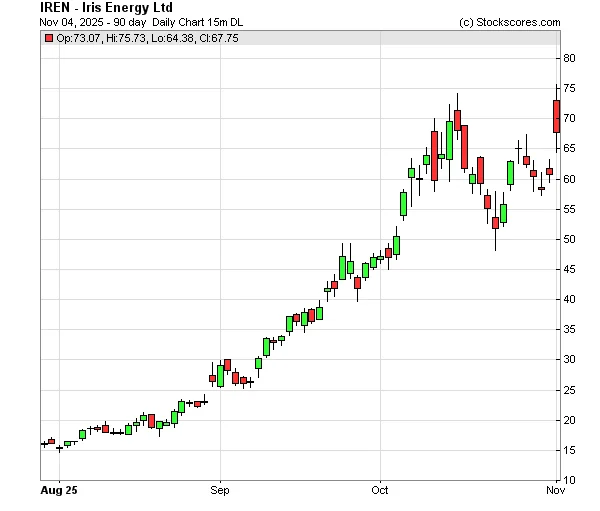IREN and Coinbase: More Than Just Crypto Hype?
The crypto market is buzzing again, with Bitcoin flirting with its all-time highs. But savvy investors are looking beyond the coins themselves, eyeing the companies that facilitate the crypto economy. Two names consistently popping up are IREN (formerly a crypto miner, now pivoting to AI) and Coinbase (a leading crypto exchange). Are these just inflated crypto plays, or are there solid fundamentals beneath the surface? Let's dig into the numbers and see what they reveal.
IREN's transformation is particularly intriguing. The company is shifting from crypto mining to AI data centers, capitalizing on the insatiable demand for computing power from tech giants. Microsoft recently inked a deal with IREN worth up to $9.7 million over five years. The deal gives Microsoft access to Nvidia's GB300 GPUs at IREN's facility in Childress, Texas. An under-the-radar AI stock is surging on news of a blockbuster deal with Microsoft
The company boasts 810 megawatts of data center capacity and nearly 3 gigawatts of contracted, grid-connected power. Management is touting that those 3 gigawatts could translate into billions of dollars, based on previous deals. (I'm always wary of projections, but the scale is undeniably impressive.) IREN expects to have most of that power available by the end of 2027.
But here's where the narrative gets interesting. IREN initially made most of its revenue from Bitcoin mining. However, they are projecting significant growth for their cloud segment, expecting over $500 million in annual recurring cloud revenue by the end of Q1 2026. That's a rapid acceleration from their earlier projection of $200 million to $250 million by the end of this year. Such a dramatic upward revision raises a question: Is this organic demand, or are they simply pricing aggressively to win market share?
And this is the part of the report that I find genuinely puzzling. While IREN is making big moves into AI, Bitcoin still plays a significant role. In August, IREN mined 668 Bitcoin, translating to $50.8 million in hardware profits, with a 66% hardware profit margin. That's a healthy margin, no doubt, but it also highlights the company's continued reliance on crypto mining.
Coinbase: Riding the Crypto Wave, Diversifying Revenue
Coinbase, on the other hand, is a more established player. As the largest U.S.-based crypto exchange, it holds $1.8 billion in crypto assets as of June 30, 2025. While transaction revenue dipped slightly year-over-year, stablecoin revenue is surging, up by 38.3% year-over-year. This growth is attributed to the GENIUS Act, which is setting up the regulatory foundation for the wide adoption of stablecoins.

Coinbase is also a custodian for more than 80% of U.S. Bitcoin and Ethereum ETFs, making it a preferred choice for institutional investors. As Bitcoin approaches all-time highs, this position should translate into increased transaction revenue.
Here's another interesting nugget: Coinbase owns 8.5 million shares of Circle (CRCL), a company also benefiting from stablecoins. That stake has appreciated significantly year-to-date, contributing to Coinbase's bottom line.
So, what's the takeaway? Both IREN and Coinbase are benefiting from the renewed interest in crypto, but they're also diversifying their revenue streams. IREN is betting big on AI data centers, while Coinbase is expanding its services beyond crypto trading.
A Calculated Gamble, Not a Sure Thing
While both IREN and Coinbase present compelling investment cases, they're not without risk. IREN's transformation into an AI player is still in its early stages, and its reliance on Bitcoin mining could be a drag if crypto prices decline. Coinbase's transaction revenue is still tied to crypto trading volume, making it vulnerable to market volatility.
Ultimately, investing in these companies is a calculated gamble. They offer exposure to the potential upside of the crypto market, but they also come with their own unique set of challenges.




